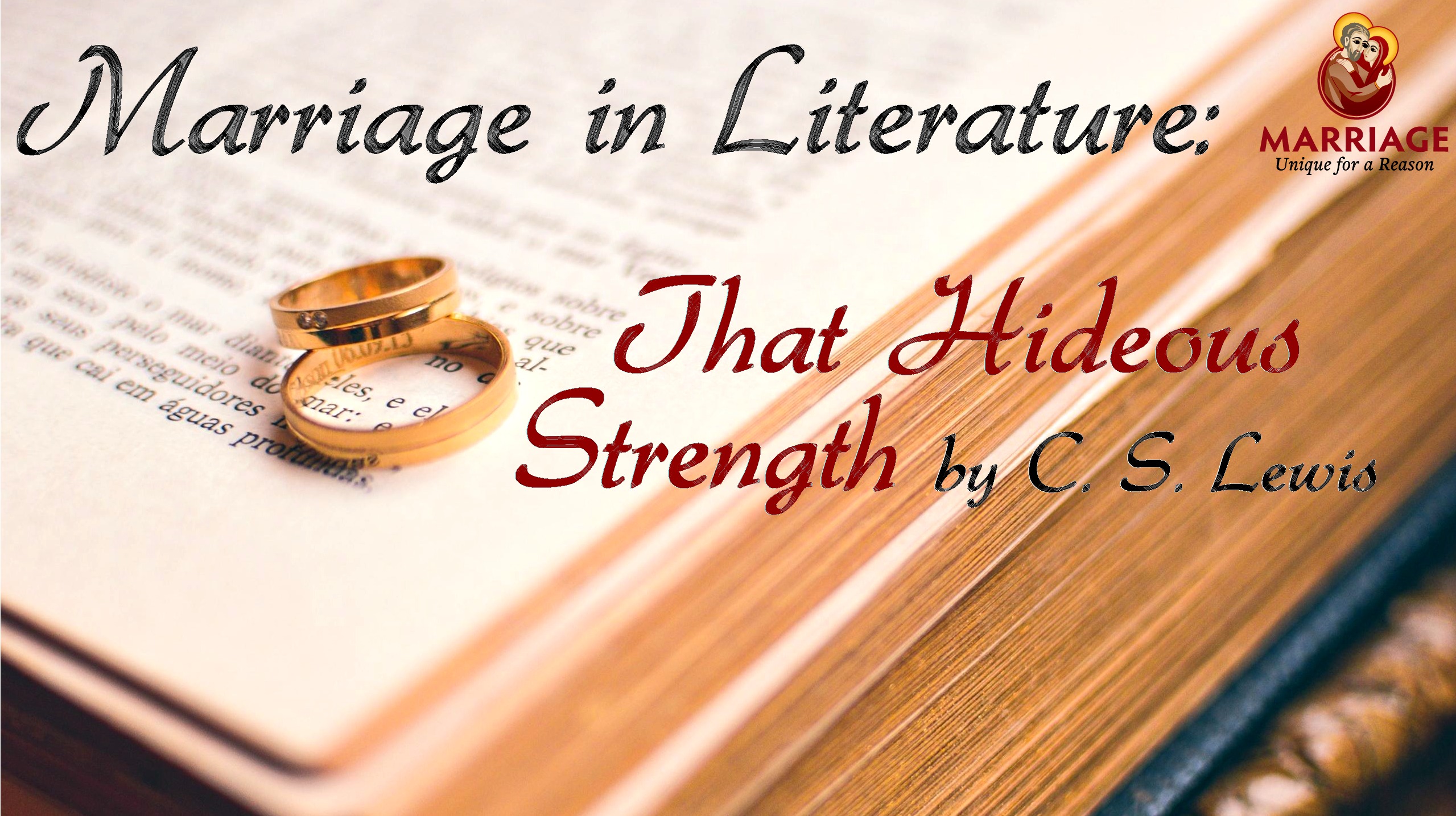That Hideous Strength by C. S. Lewis (published in 1945)
The last of his “Space Trilogy,” C. S. Lewis’s That Hideous Strength explores Christian marriage as a force for good in the world. The book opens this way: “‘Matrimony was ordained, thirdly,’ said Jane Stubbock to herself, ‘for the mutual society, help, and comfort that the one ought to have of the other.’ She had not been to church since her schooldays until she went there six months ago to be married, and the words of the service had stuck in her mind”(p. 11). The novel begins with Jane’s contemplation of how marriage has not turned out the way she thought it would, and ends with Jane and her husband, Mark, recognizing the deep meaning of their marriage.
Here are three things that we can contemplate about marriage through this novel:
- Open communication between spouses is both important and difficult.
Despite being a fantasy novel, there is great realism in Lewis’s depiction of the spats and subtexts of married life. The whole of Chapter two, part three, is devoted to a conversation between Jane and Mark about whether Jane minds Mark’s staying out of town for a few days. It references tones of voice and Jane’s internal dialogue. Lewis notes that at times neither of the spouses really knows what he/she is doing or why. After their morning spat, in which they are clearly not understanding one another, Lewis writes, “The upshot of it was that Mark gave himself a very bad cut while shaving… while Jane decided, through a mixture of motives, to cook Mark an unusually elaborate breakfast—of which she would rather die than eat any herself—and did so with the swift efficiency of an angry woman, only to upset it all over the new stove at the last moment. They were still at the table and both pretending to read newspapers when Lord Feverstone arrived” (p.45-46). A seemingly simple question (Mark’s, “Do you feel quite alright this morning?” quickly led the characters through a wide range of emotions and confusion because of other unresolved issues in their marriage.
- Married couples are fruitful in many ways besides natural children.
In the fight between good and evil which is at the heart of That Hideous Strength, married couples play a key role. Dr. and Mrs. Dimble, for example, are important characters fighting for good. This couple is a great example of the spiritual fruitfulness of Christian marriage. Mrs. Dimble says, almost in passing, that she does not mind losing their home too much because it had “all those big upper rooms which we thought we should want because we thought we were going to have lots of children, and then we never had” (p. 75). But as she and her husband work for the cause of truth in the “Director’s company,” Mrs. Dimble is referred to as “Mother Dimble” and consistently takes care of the other members of the group (p.162). The Dennistons and the Maggses, other married couples, are also important to the company, which is a small band of committed people who are attempting to live their lives with love. This simple group is depicted as opposing huge machinations of evil on the other side of a conflict for the world’s future.
- Marriage is what God says it is; and this truth sets us free.
When Mark has fallen in with the wrong crowd (i.e. evil), the Director (good) tells Jane, “It would be hard for the same person to be the wife of an official [in the evil group] and also a member of my company” because they could not all trust each other (p.142). The Director wants her to convince Mark to leave the evil group by using her love as his wife. She rebels at this idea and says that the Director has a different idea about marriage than hers. “It is not a question of how you or I look on marriage but on how my Masters look at it,” the Director says (p. 144). When she finally comes around to the Director’s reasoning, Jane feels both free and beautiful, and makes the decision to “give Mark much more than she had ever given him before, [with a] feeling that in doing so she would really be giving it to the Director” (p.148). Mark, for his part, longs to be with Jane and believes that doing so “would clean away all the filth that seemed to hang about him” from his association with evil (p.186). They both realize that the path to loving God is through the other.
In the end, Mark and Jane come to recognize their own flaws and the ways they have hurt one another. They approach one another in humility and love. May all married couples do the same, and by so doing, contribute in their own way to the salvation of all.

Leave a Reply